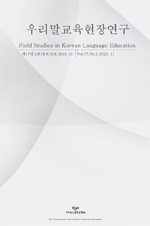문학 교사 입장에서 본 마사 누스바움의 ‘시적 정의’ 개념은 흥미로운데, ‘문학적 정의’로 불러도 무방하다. 개인적 소설 읽기에서 경험한 상상력이 ‘공적 추론’ 과정을 통해 ‘합리적 감정’으로 승화하는 데는 ‘공동체’적 이성의 장이 필요하다. ‘감정’과 ‘이성’의 조화를 얻은 이 체험은, ‘타인의 삶’에 대한 ‘연민’을 통해 ‘의지’적 차원의 결론인 ‘독자-배심원’ 개념에 이른다. 본 연구자는 톄닝의 중국소설 「도망」을 통해 ‘공감’ 단원으로 재구성된 수업을 시도했다. 소설은 라오쑹과 라오샤의 생각과 태도의 차이를 좁히지 못했기 때문에, 아무 ‘대화’도 없이 희화화된 묘사로만 마무리된다. 수업은 ‘만약 두 사람이 다시 만나면 무엇을 말할까’의 질문에서 비롯된, ‘돈’과 ‘몸’의 갈등을 주제로 한 ‘역할토론’의 방식으로 진행했다. 전반부는 ‘옹호’와 ‘반박’의 이성적 토론에만 집중했는데, 라오쑹은 돈의 ‘소유권’을 변호하고 자기 몸보다 가족 생계의 ‘우선순위’를 주장했지만, 라오샤는 라오쑹을 사기 범죄자로 ‘의심’하며 자신이 공범으로 오해받는 상황에 ‘분노’했다. 깊어진 ‘감정’의 갈등만 확인하게 되었고, 토론의 후반부는 이 감정에 주목해 ‘진심’과 ‘공감’의 대화로 집중했다. 이 활동으로 ‘시적 정의’란, 자신과 관점이 다른 상대를 ‘응징’만 하려는 형벌적 정의가 아닌, 상대 입장을 배려하는 언어활동을 통해 관계를 ‘회복’시키려는 배심원의 판결, 다시 말해 ‘연민’에 바탕을 둔 정의임을 확인할 수 있었다.
Martha Nussbaum’s concept of “poetic justice” from the perspective of a literature teacher, which can be called “literary justice,” is interesting. A “community” field of reason is necessary for the imagination experienced while reading personal novels to be sublimated into “rational emotions” through the process of “public reasoning.” This experience, which achieves harmony between “emotion” and “reason,” reaches the concept of “reader-juror,” a conclusion at the level of “will,” through “compassion” for “the lives of others.” This researcher taught a class reorganized into the “empathy” through the Chinese novel Tie Ning’s Runaway, which ends with only a caricatured description without any “dialogue” to show how it failed to bridge the gap between Lao Song and Lao Xia’s thoughts and attitudes. A role discussion was conducted in class with the theme of the conflict between “money” and “the body,” which originated from the question, “What would the two people talk about if they met again?” The first half focused only on the rational discussion of “advocacy” and “refutation,” which centered around Lao Song’s defense of his “ownership” of the money and “priority” of his family’s livelihood over his body, and Lao Xia’s “suspicion” of Lao Song as a fraudulent criminal and “anger” at accusations of being an accomplice. The first discussion revealed that only the deepening conflict of “emotions” was confirmed. The second half of the discussion focused on this emotion and the conversation between “sincere” and “emotions.” Through this activity, it was shown that “poetic justice” is not a punitive justice that only seeks to “punish” the other person who has a different point of view from one’s own; rather, it is a jury decision that seeks to “restore” the relationship through linguistic activities considerate of the other party’s position. Thus, it was confirmed that it was justice based on “compassion.”
1. 서론
2. 이론과 작품 이해
3. 수업 설계와 결과
4. 결론
(0)
(0)
